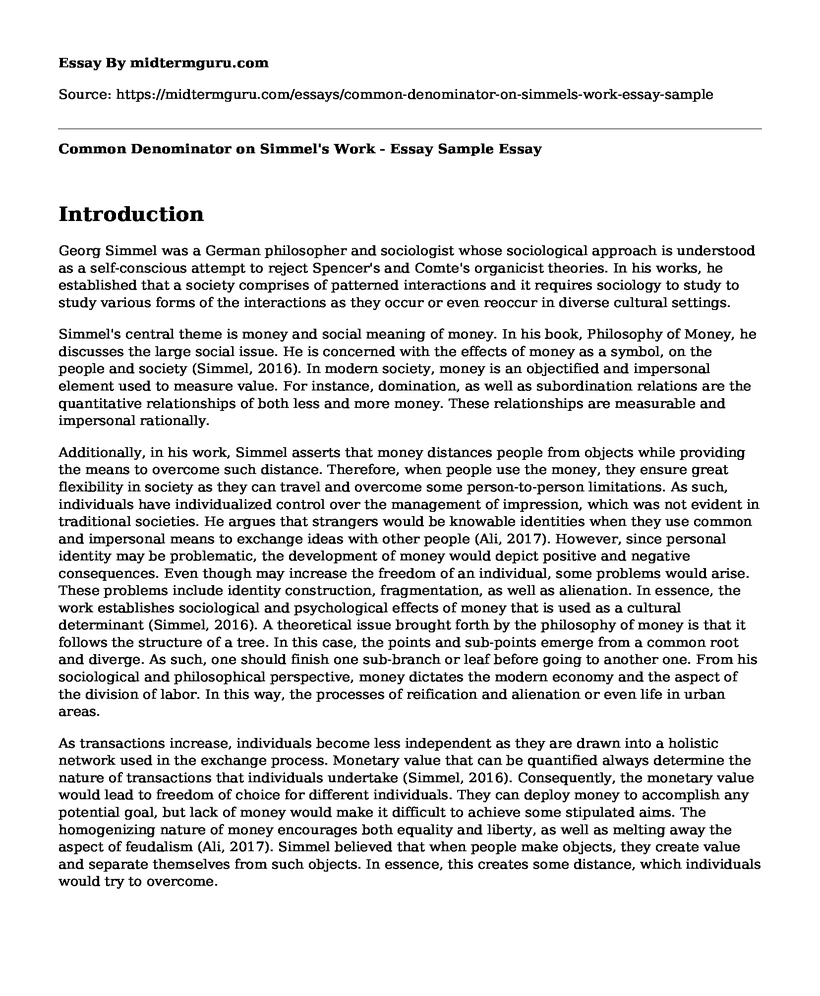Introduction
Georg Simmel was a German philosopher and sociologist whose sociological approach is understood as a self-conscious attempt to reject Spencer's and Comte's organicist theories. In his works, he established that a society comprises of patterned interactions and it requires sociology to study to study various forms of the interactions as they occur or even reoccur in diverse cultural settings.
Simmel's central theme is money and social meaning of money. In his book, Philosophy of Money, he discusses the large social issue. He is concerned with the effects of money as a symbol, on the people and society (Simmel, 2016). In modern society, money is an objectified and impersonal element used to measure value. For instance, domination, as well as subordination relations are the quantitative relationships of both less and more money. These relationships are measurable and impersonal rationally.
Additionally, in his work, Simmel asserts that money distances people from objects while providing the means to overcome such distance. Therefore, when people use the money, they ensure great flexibility in society as they can travel and overcome some person-to-person limitations. As such, individuals have individualized control over the management of impression, which was not evident in traditional societies. He argues that strangers would be knowable identities when they use common and impersonal means to exchange ideas with other people (Ali, 2017). However, since personal identity may be problematic, the development of money would depict positive and negative consequences. Even though may increase the freedom of an individual, some problems would arise. These problems include identity construction, fragmentation, as well as alienation. In essence, the work establishes sociological and psychological effects of money that is used as a cultural determinant (Simmel, 2016). A theoretical issue brought forth by the philosophy of money is that it follows the structure of a tree. In this case, the points and sub-points emerge from a common root and diverge. As such, one should finish one sub-branch or leaf before going to another one. From his sociological and philosophical perspective, money dictates the modern economy and the aspect of the division of labor. In this way, the processes of reification and alienation or even life in urban areas.
As transactions increase, individuals become less independent as they are drawn into a holistic network used in the exchange process. Monetary value that can be quantified always determine the nature of transactions that individuals undertake (Simmel, 2016). Consequently, the monetary value would lead to freedom of choice for different individuals. They can deploy money to accomplish any potential goal, but lack of money would make it difficult to achieve some stipulated aims. The homogenizing nature of money encourages both equality and liberty, as well as melting away the aspect of feudalism (Ali, 2017). Simmel believed that when people make objects, they create value and separate themselves from such objects. In essence, this creates some distance, which individuals would try to overcome.
Conclusion
In conclusion, in his theory, Simmel did not establish the value of objects based on their closeness or whether they were far away to be obtained by people. However, there is a range of factors that should be considered when determining value. These include scarcity, sacrifice, the time taken, and difficulties, which may be involved when obtaining the objects. The availability of universal currency makes everything expressible in monetary cost. Therefore, the central theme presented by Simmel is money and its social meaning in the society.
References
Ali, A. (2017). Money and social interaction in Simmel's Philosophy of Money and Audu Wazirin anduna's ballad Tsakanin an'adam da Kui. Studies of the Department of African Languages and Cultures, 51, 69-85.
Simmel, G. (2016). Religion and Monetary Culture in the Sociology of. In Sociological Theory and the Question of Religion (pp. 139-160). Routledge.
Cite this page
Common Denominator on Simmel's Work - Essay Sample. (2022, Oct 05). Retrieved from https://midtermguru.com/essays/common-denominator-on-simmels-work-essay-sample
If you are the original author of this essay and no longer wish to have it published on the midtermguru.com website, please click below to request its removal:
- Article Analysis Essay on Shaping Agility Through Digital Options
- Bob Selling Unapproved Drugs to US Consumers: Potential Harms - Essay Sample
- Class or Race: What Matters Most in Society? - Research Paper
- Paper Example on Issues that Affect Large Group of People
- Moral Philosophy: Examining Right and Wrong in Existence - Essay Sample
- Ethical Dilemmas: How to Resolve Conflicting Moral Imperatives in Organizations - Essay Sample
- Adolescents, Risk-Taking, and Self-Control: Examining the Relationship - Essay Sample







